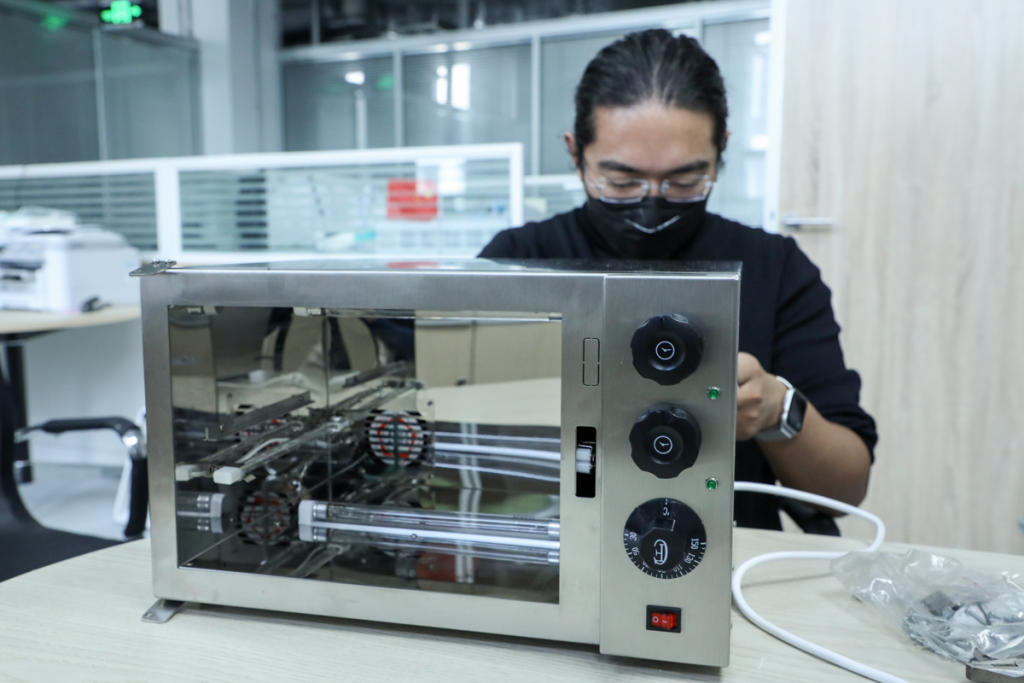“I hope that this can solve a serious problem for businesses and society. By sterilizing masks and respirators, people will feel safer in returning to work and know that their health is not at risk.”
Chair Professor Cheng Xing
Department of Materials Science and Engineering
Since the outbreak of novel coronavirus (COVID-19), mask and respirator supplies have become essential for everyone. As the demand for masks will further increase, combined with a shortage of key materials for mask production, the supplies are still tight.
Southern University of Science and Technology (SUSTech) is continuing to put its best scientific and technological foot forward in the fight against the novel coronavirus (COVID-19), with the Department of Materials Science and Engineering (MSE) Head and Chair Professor Cheng Xing devising an economical and efficient desktop sterilizer for personal protective masks.
The desktop sterilizer, known as a mask regenerator, prolongs the life of surgical masks and similar pieces of disposable personal protection. The mask regenerator sterilizes used masks by using infrared technology, which alleviates the global mask shortage and reduces the hazard of medical pollution arising from discarded masks.
Before his invention, there is no disinfection product designed for mask and other protective equipment. The desktop sterilizer integrates multiple sterilization methods, by killing bacteria and viruses in the mask without destroying the protective function of the mask.

Chair Professor Cheng Xing worked with his research team to overcome a vast array of difficulties, including tight development timelines, incomplete supply chains, and logistical challenges. Despite these challenges, the team completed their designs and prototype in less than a week. They have also applied for several patents on the back of the product, as the mask regenerator integrates multiple sterilization methods without harming the structural integrity of the mask.
The team is seeking certification and evaluation from independent testing agencies. They are aiming to get the first production run into factories, schools, and hospitals for emergency purposes. The next round of production will utilize Shenzhen’s resource advantages in electronic manufacturing to enter mass production.
MSE Chair Professor Cheng Xing explained that the combination of rapid infrared (IR) and ultraviolet (UV) irradiation effectively eliminates viruses and bacteria in less than 3 minutes.
A single device can sterilize over 400 masks in a single workday (10 working hours per day). The team collaborated with the Second Affiliated Hospital of SUSTech (the Third People’s Hospital of Shenzhen) to test the mask regenerator. Further research has been conducted into developing the next generation of the mask regenerator, that seek to regenerate masks to the point of as-new sterility.

The mask regenerator also has the potential for many other items that are used in daily life in specific industries. These enterprises include offices, kindergartens, and nursing homes, while also supporting families in seeking a clean home that aims to provide a sterile home for vulnerable members of society during times of high incidents of influenza, pneumonia or other illnesses.
Chair Professor Cheng Xing’s team includes researchers and designers, as well as SUSTech-incubated company Youtai Technology. The team has been working together on developing a variety of different instruments to take advantage of the rich resources available to SUSTech researchers and scholars.
The efforts of Chair Professor Cheng Xing’s team reflect the selfless attitude of SUSTech scholars across every discipline, as the entire SUSTech community is working together for the health and well-being of society.
He hoped that his development would solve a key challenge for businesses and the general public as they return to work and look for a safe workplace.
MSE Head Chair Professor Cheng Xing has been working at SUSTech since 2013 and also heads the Core Research Facilities (CRF). His major research foci include semiconductor materials and devices, nano-optics, MEMS, and digital biochips. He has won many awards and significant funding from top bodies across China, with the pinnacle being his approval as the leader of a major scientific research instrument development project of the National Natural Science Foundation of China (NSFC).
Proofread ByXia Yingying
Photo ByDepartment of Materials Science and Engineering, Qiu Yan